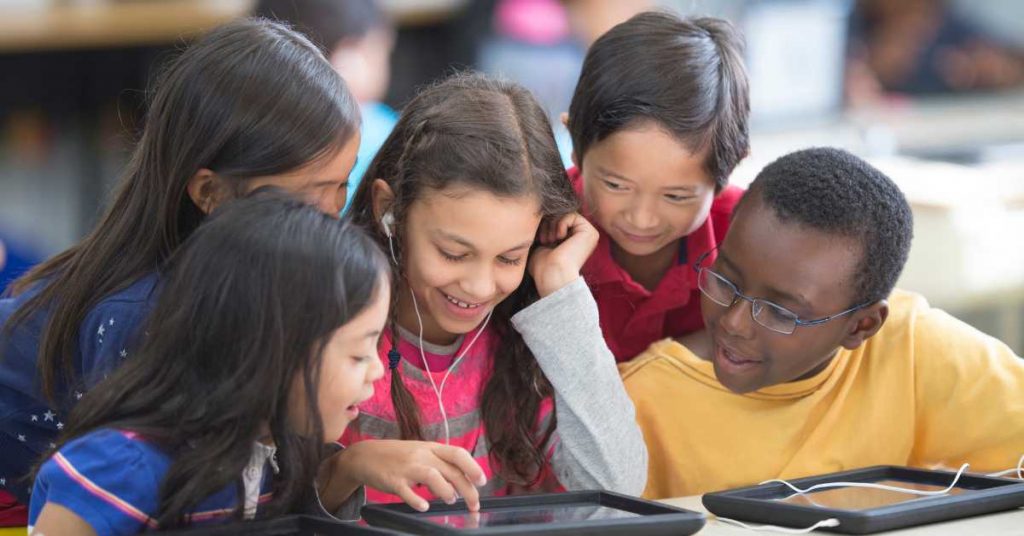How Fun & Games Shape Early Childhood Education?

Fun & Games: How Parents Can Support Early Learning Through Fun Activities You want to give your child the best early childhood education in life as a parent. But that’s not always possible. You might be up against issues such as: The best part? Learning through play. Play is not just a means of having fun, but it is the best way of learning for children. While children play, they develop the skills of solving problems, learn to share, and enhance creativity. For instance, children think they are playing make-believe. They are building with blocks to help develop motor skills and learn some basic math concepts. Some little fun & games, such as going for a walk for “I spy,” or counting apples at the store can also assist the child in learning. You don’t need fancy toys or extra time to make learning fun. In this blog, we’ll show you easy ways to use play to help your child grow and learn every day. The Science Behind Play and Learning Research proves that play is not just fun but an integral part of the early developmental process. When your little one plays, their brain makes connections that help them make sense of the world. For example, stacking blocks helps them learn about balance and gravity. Imaginative play, such as pretending to have a tea party, also supports the development of language and social abilities. Research has also shown that playing activities enhance problem-solving abilities and creativity. Problem-Solving Abilities and Creativity Experts have identified that play helps in increasing social skills in a child. For example, games like taking turns will teach patience and cooperation. Through playing, kids learn how to let others know how they feel and understand others’ feelings. This aspect of intelligence is necessary for the nurturing of good interpersonal relationships. Physical Development Running or climbing all fall under the category of active play, and this helps keep your body in good working order by strengthening muscles and improving coordination. Some, like playing tag, or riding a bike, encourage an enjoyment of motion, laying a foundation for an active lifestyle. Play-Based Learning Many schools have adopted an approach that involves learning through play. That is, play is incorporated into daily lessons so that learning becomes fun and interesting. For instance, a day at the beach can be turned into a science and math lesson when studying tide and marine life. Practical Advice for Parents Fun & Games for Multi Age Groups Each activity is discussed on a more detailed level with more benefits and possible modifications or alternatives – all still designed to combine fun and learning while being practical for parents. Educational Activities for Toddlers (1-3 Years Old) 1. Sink or Float Experiment Benefits: Variations: 2. Texture Walk – Exploring Senses Benefits: Variations: 3. Sorting and Matching with Real Objects Give your child everyday objects and ask them to sort them: Praise them for finishing a set and encourage talking about the objects. Benefits: Variations: Educational Activities for Preschoolers (3-5 Years Old) 1. Letter and Number Hunt – Learning Through Play Benefits: Variations: 2. Ice Cube Rescue – Fine Motor Skills & Science Benefits: Variations: 3. Grocery Store Math – Learning with Everyday Errands At the grocery store, ask your child to: Benefits: Variations: 4. Shadow Drawing – Art Meets Science Benefits: Variations: Educational Activities for Kids (5-7 Years Old) 1. Money Counting with Canadian Coins Benefits: Variations: 2. DIY Weather Station – Observing Nature Benefits: Variations: 3. Create a Storybook – Boosting Language Skills Benefits: Variations: 4. Build a Mini City with Recyclables – STEM Learning Benefits: Variations: 5. DIY Compass & Nature Navigation Benefits: Variations: These activities go beyond basic play by incorporating real learning in a fun and hands-on way. Whether you’re at home, outdoors, or running errands, there’s always an opportunity to help your child learn through experience. Final Thoughts For a child, play is not simply a form of entertainment; it is the most effective way for them to learn. Each activity, such as building towers out of blocks, running around in tag, or even using an educational app, all aid in the child’s learning and development. Playing hints at a child’s ability to learn to tackle challenges, be inventive, and be self-assured. As a parent, fancy toys or pricey programs aren’t required to nurture your child’s love for learning through play. Allow them to play, enjoy themselves, and discover because children learn the most when they don’t realize that they are doing so. Looking for fun ways to help your child learn? Check out KidsAge that makes playtime educational and exciting! FAQs 1. How much playtime does my child need? Because children learn best while playing, it is advisable that they partake in a few hours of physical activity every day. Outdoor activities, unstructured play with children’s toys, and other activities such as puzzles and board games all count. 2. What are some easy educational activities I can do at home? You can: 3. Are mobile games good for learning? Yes, if you choose the right ones! Games that teach letters, numbers, and problem-solving can be helpful. Just keep screen time balanced with hands-on activities and outdoor play. 4. How can I encourage play if I have a busy schedule? Even small moments count! Sing songs while driving, play guessing games while shopping, or let your child help with simple tasks at home. The goal is to make learning fun and natural in everyday life.
Making Learning Fun for Kindergarteners: Engaging Educational Activities Parents Will Love

Making Learning Fun for Kindergarteners: Engaging Educational Activities Parents Will Love Are you finding it challenging to keep your little one engaged in learning? Home is a child’s first learning environment; blending fun with education is not just essential; it’s a joyful journey. By creating a playful and interactive atmosphere, your toddler can enjoy the learning process while developing crucial skills. Here are some exciting ideas to make learning a delightful adventure for your kindergarteners, sparking joy and excitement in their educational journey! 1. Reading Aloud with a Twist :Incorporate interactive props or puppets, such as a colorful storybook with pop-up characters or a hand puppet representing the story’s main character, to transform storytime into an engaging experience. This will capture your child’s imagination and encourage active participation. It’s a fantastic way to enhance their language skills and make reading a joyful pastime. 2. Fun Learning Games :Engaging games like “Number Hunt” and “Alphabet Scavenger” are perfect for turning learning into a playful exploration. These activities promote counting and letter recognition through exciting challenges. Who said learning can’t be an adventure? 3. Explore the Great Outdoors:Take learning outside! Nature walks foster an appreciation for the environment while promoting physical fitness. Observe plants, insects, and changing seasons together—this hands-on experience deepens their connection to the world around them. 4. Get Creative with Art Projects :Encourage creativity with simple art projects. Whether finger painting or crafting with recycled materials, these activities promote self-expression and help develop fine motor skills while having a blast! 5. Incorporate Music and Dance :What better way to learn than through music and dance? Incorporating songs and movement into educational activities makes learning fun and enhances coordination and memory. Plus, it’s a great way to burn off some energy! 6. Balance Technology with Hands-On Learning :While technology can complement traditional learning methods, moderation is key. Strike a healthy balance between screen time, such as allowing 30 minutes of educational app use per day, and hands-on experiences, like engaging in physical activities or creative projects, to foster a well-rounded approach to education. 7. Embrace Play-Based Learning :Play-based learning is crucial for fostering creativity and critical thinking. Hands-on activities like using playdough, building with blocks, and painting help kids explore concepts in a relaxed way, making learning enjoyable and effective. 8. Involve Parents as Learning Partners :Lastly, active parental participation is not just beneficial; it’s crucial. It strengthens the learning experience and shows your child that education is a shared journey. As a parent, you play a significant role in creating a home environment that encourages exploration and curiosity, instilling a lifelong love for learning. Your involvement is not just appreciated; it’s essential. Gamified learning platforms like Kidsage can provide all these and much more for your child’s early learning. Kidsage provides games with educational content, ensuring that your child is having fun and learning. It’s a win-win situation for everyone, and it gives you the confidence that your child’s education is in good hands, providing a secure and effective learning environment. Incorporating Kidsage into your daily routine can turn ordinary moments into extraordinary learning opportunities. Let’s make learning fun for our kindergarteners and create lasting memories with Kidsage! Want to explore engaging educational activities: Try Kidsage Now! Download here!
Top 8 Online Games for Kids Aged 5-7 This Winter Break: Fun, Educational Activities

As winter break is in full swing, parents often look for engaging activities to keep their toddlers entertained. With cozy days spent indoors, online games can be a fantastic option, combining fun and education. Here is a roundup of the top 8 online games for kids aged 5-7 that will keep them engaged, learning, and, most importantly, having a blast during the holiday season! These games are educational and interactive, ensuring your child’s full engagement. Lists of top 8 online games for kids aged 5-7 : 8. Coolmath Games While primarily known for older children, Coolmath Games has a section suitable for younger kids. Parental supervision might help here, as some games may require adult guidance. These games promote logical thinking and problem-solving skills in a fun, interactive way. 7. PBS Kids Games PBS Kids offers many free games based on popular educational shows like Curious George, Wild Kratts, and Sesame Street. These games focus on various skills, including math, reading, and science. The vibrant graphics and beloved characters make these games especially appealing to young children. 6. Starfall Starfall is a fantastic resource for helping children learn to read. The platform offers free interactive games and activities that teach phonics, vocabulary, and comprehension. The engaging animations and easy-to-follow instructions make learning enjoyable for young kids. 5. National Geographic Kids For toddlers curious about the world, National Geographic Kids offers interactive games that explore animals, geography, and science. Kids can learn about different cultures and environments through fun quizzes and virtual adventures while developing critical thinking skills. 4. Funbrain Jr. Funbrain Jr. is explicitly designed for preschoolers and early elementary-age kids. It features various educational games covering math, reading, and problem-solving. The colorful graphics and simple controls make it accessible for toddlers, making learning a breeze. 3. ABCya ABCya provides high-quality educational games for kids, including interactive activities that cover math, reading, and general learning skills. Children can practice counting, spelling, and critical thinking with various themed games while having fun. The website is user-friendly, making it easy for toddlers to navigate. 2. ABCmouse While it typically charges a subscription fee, ABCmouse offers promotional periods during which you can access its resources for free. This interactive platform covers a wide range of subjects for young learners, including reading, math, art, and music. Kids can enjoy games that involve puzzles, songs, and storytelling, fostering a love for learning. 1. Kidsage Kidsage is a fun, interactive platform designed for young children. It offers a variety of educational games and activities covering subjects such as math, reading, and creativity. The Parent dashboard allows parents to keep track of their child’s progress, including the games they’ve played, their scores, and areas where they may need more practice. With colorful visuals and personally tailored age-appropriate challenges, Kidsage fosters learning and play. Tips for Keeping Kids Safe Online While exploring these online games, ensuring a safe environment for your toddlers is essential. Here are some helpful tips to keep your kids safe and secure while they enjoy these educational games. These measures are designed to give you peace of mind as your children engage with these online activities: Supervise Playtime: Always supervise your kids as they play online to ensure they are safe and engaged with age-appropriate content. This can help prevent exposure to inappropriate content and ensure they are not spending excessive time in front of screens. Conclusion Winter break can be an excellent time for kids to relax and enjoy fun learning experiences. Parents can provide their toddlers with enriching, educational, and enjoyable activities by utilizing these free online games. By doing so, you’re keeping them entertained and investing in their education. Enjoy this holiday while helping your little ones grow and learn in a fun environment! Happy gaming! Want to explore engaging educational activities: Try Kidsage Now! Download here!